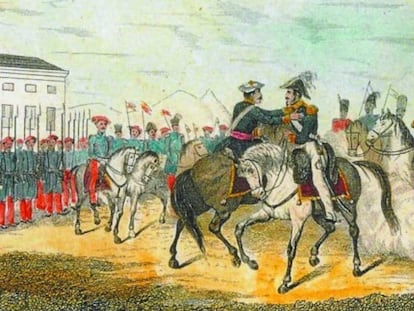The oracle and the omniscient narrator

You didn't have to be the oracle of Newcomb's paradox to foresee that last week's installment would provoke numerous comments. As both Robert Nozick and Martin Gardner pointed out, the very idea that there might be a being capable of predicting the future has transcendental philosophical implications, regarding which, it seems, people adopt opposing and irreconcilable positions: those who are absolutely certain that we must take both boxes believe that those who would only take the closed box are crazy, and vice versa. And the fact is that, as if by chance, the problem of the two boxes refers back to the age-old question of free will: if someone knows with certainty what I'm going to do, I can't do anything else: either the oracle can be wrong, or my ability to choose is illusory.
However, one cannot ignore the fact that hundreds of millions of people believe in an omniscient being who knows with absolute certainty everything we are going to do and that this does not mean that we are no longer free to choose, because otherwise we would not be responsible for our actions (incidentally, these people also believe, or think they believe, that an infinitely just and kind being can inflict eternal punishment on you for having sex outside of marriage or not going to mass on Sundays).
How is this possible? The key could lie in a well-known Jesuit maxim: "If your superior says it's nighttime, you have to believe him even if you see the sun shining." In other words: put reason aside and believe everything your pastors tell you, no matter how absurd or contradictory (psychologists call this cognitive dissonance ; but that's another article, and another columnist).
As for the story of the man who dies from a fright caused by a nightmare (with the help of his caring wife), it has a lot to do, although at first glance it might not seem so, with Newcomb's paradox, since it is only credible if the story is told to us by the usual "omniscient narrator," a being as implausible as the accurate oracle and who is only admissible as a literary convention. Since the story is told to his naive students by a philosophy professor who tells them it is based on real events, it is not credible, since no one could have known what the unfortunate protagonist was dreaming, unless his wife were telepathic, deliberately held a knitting needle through his neck, and then confessed to her crime. Or can you think of a possible explanation that doesn't involve the intervention of paranormal faculties?
The paradox and the dilemmaAn astute reader saw a connection between Newcomb's paradox and the "prisoner's dilemma." This association is apt, since Newcomb himself said that his paradox occurred to him while he was reflecting on the famous dilemma. Let's recall its classic version:
The police arrest two suspects. There isn't enough evidence against them, so an inspector visits them separately and offers them both the same deal: if one confesses and the other doesn't, the first will go free and the second will be sentenced to ten years in prison; if both confess, they will both be sentenced to six years; and if neither confesses, they can only be sentenced to one year for a lesser charge.
What would you do, and why, if you were one of the suspects? What is the subtle relationship between the prisoner's dilemma and Newcomb's paradox?
Do you want to add another user to your subscription?
If you continue reading on this device, it will not be possible to read it on the other device.
ArrowIf you want to share your account, upgrade to Premium, so you can add another user. Each user will log in with their own email address, allowing you to personalize your experience with EL PAÍS.
Do you have a business subscription? Click here to purchase more accounts.
If you don't know who's using your account, we recommend changing your password here.
If you decide to continue sharing your account, this message will be displayed indefinitely on your device and the device of the other person using your account, affecting your reading experience. You can view the terms and conditions of the digital subscription here.

He is a writer and mathematician, a member of the New York Academy of Sciences. He has published more than 50 popular science works for adults, children, and young adults, including "Damn Physics," "Damn Mathematics," and "The Great Game." He was the screenwriter for "La bola de cristal."
EL PAÍS







